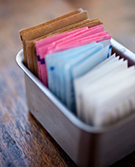The Trouble With Sugar Substitutes

All approved artificial sweeteners are considered FDA safe. So, many Americans use them to protect their teeth, cut calories, and minimize insulin spikes.
What's not to like? Well, a new study suggests certain people react negatively to sucralose because artificial sweeteners may not be as inert as we thought.
The researchers selected a group of people with a body mass index of over forty-two. Thirty is considered obese. They were placed in two groups where one was given sucralose before drinking a glucose or sugar solution and the other drank water first. On a separate day the groups were reversed so they could compare each person's results directly.
The researchers were surprised to find those who drank sucralose first had a twenty percent higher insulin level than those who drank water before the sugar solution. This means the artificial sweetener sucralose was triggering the body to make additional insulin which affects blood glucose levels.
This is contrary to the prevailing thought that sugar substitutes should not affect insulin production. It turns out there are sweet response receptors in the gut and pancreas similar to ones on the human tongue. When they are stimulated, additional hormones are released, including insulin. This happens despite very low levels of artificial sweeteners.
The effect so far is only seen in people who are obese, and the concern is that elevated insulin levels can lead to insulin resistance and type two diabetes. So, until scientists can confirm the effects of sucralose, it may be wise to not overdo the sugar substitutes.
More Information
Artificial Sweeteners May Do More Than Sweeten: It Can Affect How the Body Reacts to Glucose
"Researchers at Washington University School of Medicine in St. Louis have found that a popular artificial sweetener can modify how the body handles sugar."
Artificial sweeteners and other sugar substitutes
Mayo Clinic website that has extensive information about these sweeteners, their use and advantages/disadvantages
Artificial Sweeteners
Authoritative information from the American Diabetes Association
Brain Cannot Be Fooled by Artificial Sweeteners; Higher Likelihood of Sugar Consumption Later
"Eating low-calorie sweetened products ' especially when hungry or exhausted ' may lead to a higher likelihood of seeking high-calorie alternatives later, due to a newly discovered signal in the brain, suggests new research published in The Journal of Physiology."